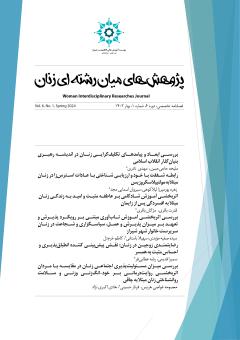بررسی ابعاد و پیامدهای تکلیفگرایی زنان در اندیشه رهبری بنیانگذار انقلاب اسلامی
محورهای موضوعی :ملیحه حاجی حسن 1 , مهدی نادری 2
1 - دانشجوی دکتری مطالعات سیاسی انقلاب اسلامی دانشگاه شاهد، تهران، ایران.
2 - دانشیار گروه علوم سیاسی دانشگاه شاهد، تهران، ایران.
کلید واژه: رهبری بنیانگذار انقلاب, تكليف¬گرايي زنان, ارکان تکالیف زنان, نظام دانایی زنان.,
چکیده مقاله :
تلازم «حق» و «تكليف» انساني از بنياديترين موضوعات مكاتب فكري بشري بوده و هر مكتب فكري ميكوشد با ترسيم نظام دانايي، پاسخي شايسته به اين مهم بدهد. در منظومه فكري امام خمینی بهعنوان رهبری انقلاب، مسئله تكليفگرايي مبناي عملگرایی قرارگرفته و سعادت و شقاوت جامعه انساني درگرو عمل به وظيفه و تکلیف است. ایشان بهصورت ویژه به مسئله تکلیفگرایی زنان پرداخته و زمینهها و ابعاد مختلف آن را مطرح نمودهاند. با توّجه به جایگاه و هویت زن در اندیشه بنیان¬گذار انقلاب اسلامی، شعاع تکلیفگرایی زنان در زوایای علماندوزی آنان چنان برجسته است که ایشان بانوان را بهعنوان احیاگران فکر و اندیشه معرفی نموده است. (مسئله) در نگاه تكليفگرايانه امام، زنان انسانساز اگر از جامعه بشری و ملتها گرفته شود، ملتها به شکست و انحطاط کشیده میشوند. درنتيجه لازمه تحقق سعادت جامعه زنان انقلاب اسلامي، شناخت ابعاد و پیامدهای تکلیفگرایی زنان در اندیشه رهبری بهعنوان یک رکن مهم جامعه، دارای اهمیت است. اين مقاله ميكوشد به تبيين ابعاد و پیامدهای تكليف گرايي زنان در اندیشه رهبری بنیان¬گذار انقلاب اسلامی بپردازد. نظر به اهمیت اين موضوع، اين پژوهش با روش هرمنوتیک متن محور (روش)، درصدد پاسخ به اين پرسش است: «ابعاد و پیامدهای تکلیفگرایی زنان در اندیشه رهبری بنیان¬گذار انقلاب اسلامی چیست؟»(سؤال) يافتههاي پژوهش حكايت از آن دارد که تكليفگرايي زنان بر بنيانهاي اندیشه هفتگانه امام «تکلیف به مثابه منشأ عمل»، «تکلیف یک امر همگانی»، «محدوده تکلیف، توان انسان»، «درونی و عقلانی بودن احساس تکلیف»، «شرعی بودن امر تکلیف»، «پیروزی مطلق در عمل به تکلیف»، «واجب بودن ادای تکلیف» استوار شده است. لذا، ابعاد تكليف گرايي زنان در انديشه رهبری انقلاب متشكل از اركان عبادي، خانواده، اقتصادي، سياسي و علمی است و همچنین، پیامدهای تكليف گرايي زنان در بعد فردي، انسانسازی و در بعد جمعي، جامعه¬سازی بر اساس مكتب پاک محمّدي است.
The synthesis of human "rights" and "duties" constitutes one of the most fundamental issues of human intellectual traditions, each striving to provide a coherent response through the establishment of a knowledgeable system. Within the intellectual framework of Imam Khomeini (RA) as the leader of the revolution, the concept of duty orientation forms the basis of pragmatism action, where societal happiness and prosperity hinge upon fulfilling one's duties. Specifically addressing the issue of women's duty orientation, he highlighted its various dimensions and implications. Given the pivotal role and identity of women in the ideology of the Islamic Revolution's founder, their duty orientation radiates prominently within their intellectual endeavors, portraying them as catalysts for the revival of thought and ideology. In Imam's task-oriented perspective removing women, who are creators of humanity, from human societies and nations, would lead to societal decline and failure. Therefore, understanding the dimensions and consequences of women's duty orientation in leadership thought is crucial for achieving societal happiness within the Islamic Revolution. This article aims to elucidate these dimensions and consequences in the framework of Imam Khomeini's leadership thought using a hermeneutic text-centered approach. The research seeks to answer the question: "What are the dimensions and consequences of women's duty orientation in the leadership thought of the founder of the Islamic Revolution?" The findings of the research indicate that women's commitment is anchored in the Imam's sevenfold thought: "Duty as the origin of action", "Duty is a universal matter", "The scope of duty and human capability", "The internal and rational aspects of duty", " The legitimacy of Islamic duty "Achieving absolute victory through fulfilling duty," and "The obligatory nature of duty". Therefore, the dimensions of women's responsibilities in the leadership thought of the revolution encompass religious, familial, economic, political, and scientific domains. Furthermore, the consequences of women's responsibilities in individual empowerment and societal cohesion, are grounded in the sacred teachings of Muhammad.
